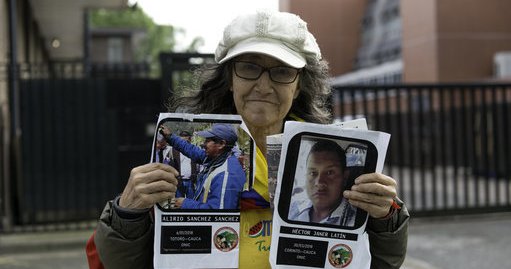
On the one hand, the international organization recognizes the political dimension of the activities that the murdered leaders participated in and the key role that their work plays in a democratic society. In doing so, it highlights the existence of a systematic pattern due to its special characteristics.
From another perspective, the Colombian government continues to ignore that when a person dedicated to defending the interests of their communities is assassinated, it is not only an attempt on the lives of individuals; it also seeks to silence collective causes and instill fear among those who believe in them. Therefore, the murder of social leaders has negative impacts on specific people and harms local dynamics of social transformation, community strengthening and consolidation of participatory democracy.
Additionally, while the government has maintained that those responsible for the murder of the leaders are social actors belonging to criminal structures and common crime, the UN report highlights that in addition to these, state security bodies and national and international companies are also involved. 30% of the attacks occurred in areas with large-scale mining projects, and 28.5% in regions with agribusinesses (large estates). In this way, the UN highlights how a particular development model seems to coexist with the presence of threats to the leaders of the communities in which this type of initiative takes place. The murdered leaders were linked to the promotion of political and community projects by presenting a different proposal, and in some cases a counterweight to development initiatives based on the exploitation of resources by private initiatives.
In this context, finding a substantive solution requires recognizing that threats against social leaders in Colombia are not an ordinary crime, but rather an attempt by various actors to continue to repress social change in a violent way. As long as power continues to be exercised in an exclusive way that turns its back to the claims of community leaders, the silencing of voices that demand transformation will continue.
The disagreement between the UN and the government is not just a diplomatic controversy. It is an episode that raises at least two key questions: why does the government persist in delegitimizing international and national actors who denounce the systematic silencing of social leaders in the country? And, why does the Colombian government avoid mentioning the influence of some economic and political sectors in these murders?
These questions continue unanswered, as the list of murders grows longer. That international organizations are more concerned about the risk to life of social leaders than the government itself, is unheard of. As long as the government insists on trivializing this humanitarian crisis, us, civil society, will continue joining efforts to demand that the rights of our fellow citizens be protected. The lives of social leaders are sacred and their voices are not bulletproof.
PrintAna Maria Arbelaez Trujillo Fabian Andres Diaz Pabon | Radio Free (2020-04-02T16:24:03+00:00) “The situation of human rights defenders in Colombia is unsustainable”: UN. Retrieved from https://www.radiofree.org/2020/04/02/the-situation-of-human-rights-defenders-in-colombia-is-unsustainable-un/
Please log in to upload a file.
There are no updates yet.
Click the Upload button above to add an update.